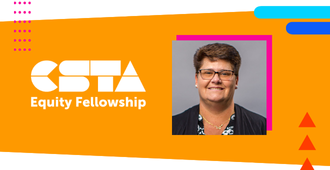Verna Elizabeth Hiser has worked in education for 22 years, with 12 of those years dedicated to gifted education and 4 focusing on computer science. A 2023 Amazon Future Engineer Teacher Ambassador, she is National Board–certified in gifted and talented education. Verna’s passion lies in providing inclusive computer science opportunities for gifted and neurodivergent students, particularly those with learning disabilities. Her commitment to STEM education is evident through her involvement in project-based learning, Maryland Engineering Challenges, FIRST Lego League robotics, and Destination Imagination. As a mother of three neurodivergent sons, Verna balances her professional life with her personal interests in Legos, reading, and acting.
Verna knows that neurodivergent, especially twice exceptional students may act out due to frustration, or they may successfully conceal their struggles through masking, or anywhere in between. Rather than let these students slip through the cracks, Verna has spent the last 15 years of her career identifying and advocating for them. “In the beginning,” she says, “it was an uphill battle explaining why a child who was struggling academically needed enrichment services.”
As she gained more experience working with neurodivergent students, Verna began to learn some common ways to support them. Dyslexic and autistic students, as well as students with ADHD, often struggle with anxiety and perfectionism; they are often visual learners for whom a primarily verbal classroom presents major challenges. These students do better with a hands-on approach in the classroom, as opposed to a traditional “stand and deliver” mode of instruction. In a setting like the FIRST Lego League, where hands-on work is the norm, Verna has found that neurodivergent students often really thrive, and she’s run multiple teams at her school since 2011. Through these robotics competitions, students work closely together, develop their leadership skills, and learn how to advocate for themselves and others.
Verna has also found ways to use tech principles to address learning challenges and emotional struggles. Last year, she began applying computational thinking as a problem-solving strategy in emotional situations, assisting her students in thinking through the chain of events that led to disruptive behaviors and emotional regulation. By encouraging her students to “think it through like a computer scientist,” Verna was able to give them better tools for managing their emotions and advocating for themselves in situations they’ve identified as their personal trouble spots. Verna says, “I believe it is imperative we teach teachers to identify and meet the needs of this group of students because they are likely the innovators and inventors of the future.”
Drawing on all that she learned (and taught herself) about supporting neurodivergent students, Verna works tirelessly to share that knowledge with other educators. She trained with the Maryland Center for Computing Education to become an elementary CS SCRIPT coach for her district, and now provides professional development to new teachers in her county. Becoming an Amazon Future Engineer Teacher Ambassador in 2023 helped her connect with like-minded CS teachers to reduce boundaries for neurodivergent students.
In 2024, Verna secured a grant from Maryland nonprofit Tequity to fund mobile robotics labs for her county. These labs will provide engaging, hands-on experience in robotics and computer science to students across the county. Verna’s now working with Harford County Public Schools to develop professional development and lesson plans to be included in the kits that travel with the labs from school to school. Most recently, she was appointed as a board member to the Maryland Coalition for Gifted and Talented Education, which advocates for gifted and high-ability students and provides resources for teachers and parents on how best to support these students.
As a CSTA Equity Fellow, Verna hopes to learn more about how to advocate for students from all marginalized groups. She recently began teaching at a school where 60% of the students are nonwhite, and 70% come from low-income families. Accordingly, she wants to learn from her cohort about how to meet the diverse learning needs of students in these populations, how to design inclusive, culturally responsive curriculum, and especially how to support these students emotionally as well as academically. “If students are not emotionally ready to learn,” she says, “even the best lesson can fall flat.”
Verna wants to identify best practices for teaching CS to visual learners, and she hopes to develop hands-on, cross-curricular CS instruction for the elementary level, highlighting in particular the needs of students from marginalized groups. Building on her success at using computational thinking to help her students address emotional problems, she’d also like to collaborate with her cohort to further her understanding of how CS and CT can enhance learning for neurodivergent students. Verna says, “These students are the innovators and inventors of the future; but if we don’t give them the proper opportunities, we will lose them.”

